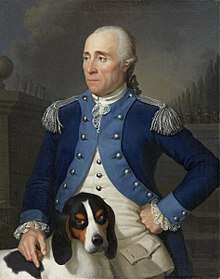Franz Rudolf Frisching
Franz Rudolf Frisching (1733–1807) was a Bernese patrician, officer, politician and industrialist.
Franz Rudolf Frisching | |
|---|---|
 Franz Rudolf Frisching in the uniform of an officer of the Bernese Jäger Corps with his Berner Laufhund, painted by Jean Preudhomme in 1785. | |
| Born | Franz Rudolf Frisching 1733 |
| Died | 1807 (aged 73–74) |
| Spouse(s) | Anne Madeleine van Back (1738–1763) Secondly Frisching married Armanda Gross (1743–1829) in 1764 (the marriage was divorced later) |
| Children | First marriage: Johann Rudolf (1761–1838) Anna Adrienne Margarethe (1755–1800) Second marriage: Julia Armanda (1768–1807) |
| Parent(s) | Vinzenz Frisching (1689–1764), Master of Schlosswil |
Life and career
Franz Rudolf Frisching was the son of Vinzenz Frisching (1689–1764) who was Master of Schlosswil. In 1748 Franz Rudolf Frisching became a member of the Swiss Guard of the Netherlands where he achieved the rank of a colonel.[1] In 1764 Frisching became a member of the Grand Council of Bern. In 1770 he became bailiff in the Vallemaggia, in 1780 bailiff in St. Johannsen and in 1793 office holder in Wimmis.[2] He was lieutenant colonel of the Bernese Jäger Corps.[3]
Franz Rudolf Frisching was the founder of the Frisching Faience Manufactory in Bern.[4]
Between 1750 and 1777 the Frisching family was in the possession of the large Lorraine Gut, a former country estate which is now part of the city of Bern.[5] Franz Rudolf Frisching’s ancestor, Samuel Frisching (II), built the Frisching-Haus, now known as the Béatrice-von-Wattenwyl-Haus on the Junkerngasse in Bern.
Notes
- Burgerbibliothek Bern, FA von Tscharner A 126 (16). Certificate of appointment for Franz Rudolf Frisching de Wyl, appointed as a member of the Swiss Guard in the rank of a lieutenant. Dated: Denstage den 7 July 1748, signed: Prince d'Orange & Nassau, Ter Ordonnantie van Zyne Hoogheid
- Staatsarchiv Bern, HBLS Bd. 3, p. 341
- Schreibkalender samt dem Regimentsbüchlein beinhaltend die weltliche und geistliche Verfassung der Stadt und Republik Bern auf das Jahr 1775
- Historisches Museum Bern: Geschirr für Stadt und Land – Berner Töpferei seit dem 16. Jahrhundert, Bern 2007, p. 22
- Adolf Hebeisen: Die Lorraine in Bern. Verlag Paul Haupt, Bern 1952, p. 13
References
- Walter A. Staehelin: Keramische Forschungen aus bernischen Archiven in: Keramikfreunde der Schweiz, Mitteilungsblatt Nr. 81(1970), p. 3-34
- Robert L. Wyss: Kachelöfen. in: Bern und die bildenden Künste, in: Illustrierte Berner Enzyklopädie, Bd. IV. Kunst und Kultur im Kanton Bern, Bern 1987, p. 107-109
- Historisches Museum Bern: Geschirr für Stadt und Land – Berner Töpferei seit dem 16. Jahrhundert. Bern 2007, 2. 22-25. ISBN 978-3-9523573-8-5 (BHM)
- André Holenstein: Berns goldene Zeit. Das 18. Jahrhundert neu entdeckt, Bern 2008, p. 112
- Roland Petitmermet: Berner Uniformen 1700–1850. Historischer Verein des Kantons Bern, Bern 1977, ISBN 3-85731-002-2
External links
- Frisching, Familie in German, French and Italian in the online Historical Dictionary of Switzerland.